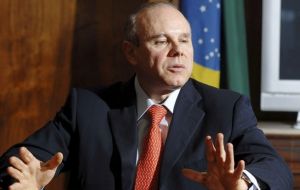MercoPress. South Atlantic News Agency
Brazil considering tax breaks and lower import tariffs to fight inflation
 Mantega said that monetary policy remains the cornerstone
Mantega said that monetary policy remains the cornerstone Brazil is considering additional anti-inflationary measures such as tax breaks and lower import tariffs but monetary policy remains the main tool to control prices, Finance Ministry officials said on Friday.
Speaking in an event in Sao Paulo, Finance Minister Guido Mantega said Brazil may do more than just raise interest rates to bring inflation back to the government target.
He is among officials who have talked tough on price pressures in recent weeks. Brazil's central bank is expected to make its first rate hike in nearly two years this month as rapid recovery in Latin America's largest economy stokes inflation.
”One must raise rates when it is inevitable but other mechanisms should be used, such as (facilitating) imports“ Mantega said at an event in Sao Paulo, without giving details. ”We have to avoid inflation going back to high levels“.
In New York, Secretary of Economic Policy Nelson Barbosa confirmed the government is studying tax cuts and lower import tariffs for specific sectors of the economy, but refused to name them.
The measures could be similar to this week's decision to extend to the end of the year tax breaks on building materials that were due to expire in June.
Demand in that sector had risen, pushing prices higher, because consumers were anticipating purchases to take advantage of the tax breaks, government officials said.
Despite possible additional measures, Barbosa said monetary policy will remain the main tool for the government to rein in inflation, which is now expected by the central bank to rise to 5.2% in 2010.
The government has an inflation target of 4.5%, plus or minus 2 percentage points, for this year.
Despite refusing to anticipate which sectors could benefit from tax breaks, Mantega did say the electricity sector was one to be monitored because prices were very high due to taxes. ”We have to keep our eyes on that,” he said.
The minister added the government remains committed to its 3.3% primary budget surplus target, even as tax cuts weighed on the country's public accounts last year.
In New York, Barbosa revealed Brazil has already resumed the trend of declining debt-to-GDP ratios that had been interrupted by the fiscal stimulus provided during the global financial crisis.




Top Comments
Disclaimer & comment rules-

Read all commentspensamento correto ~~!
Apr 19th, 2010 - 10:05 am 0but we must to think more comprehensively ~~~~
I don' t expect more higher growth (GDP) rates~~~~
Commenting for this story is now closed.
If you have a Facebook account, become a fan and comment on our Facebook Page!